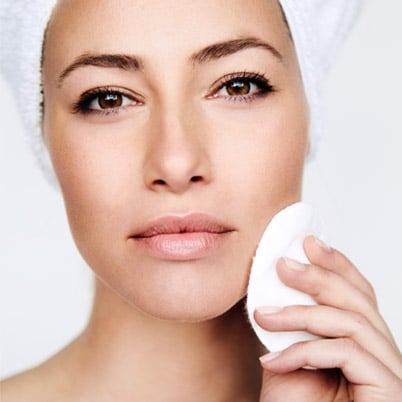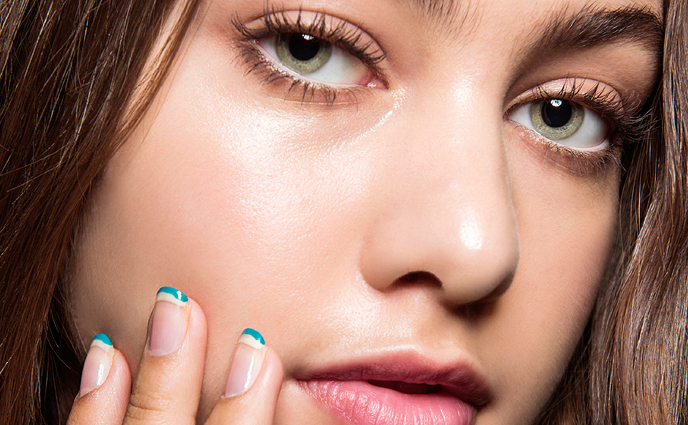If you've never had a chemical peel, you might imagine it would make your skin look like beef carpaccio a la Samantha in "Sex and the City." But the truth is, chemical peels have come a long way in the last 15 years. "You used to have redness for three to four weeks," says Los Angeles Facial Plastic Surgeon Taylor Pollei, MD, of Lasky Skin Center. Now, thanks to buffering ingredients and customizable treatments, there's minimal downtime. "Even though you're peeling, exfoliating, and flaking... you can still get out and about and do your thing. That's different from the peels I used in the past," he says.
And chemical peels can be used to treat just about anything. "All skin concerns can benefit from regular peels," says Dr. Pollei. "Fine lines, crepiness, discoloration -- those are the main issues. You'll see an improvement in skin texture and smoothness." He says he likes to recommend peels to patients because they can simultaneously treat so many things with little downtime.
So we challenged Dr. Pollei to create peel regimens for four women -- each with different skin concerns ranging from acne to aging. He accepted our challenge and gave them each a series of three or four treatments using various PCA Skin peels he offers in his office. "After one peel, you'll see some improvement, but then it's exponential," he explains.
And chemical peels can be used to treat just about anything. "All skin concerns can benefit from regular peels," says Dr. Pollei. "Fine lines, crepiness, discoloration -- those are the main issues. You'll see an improvement in skin texture and smoothness." He says he likes to recommend peels to patients because they can simultaneously treat so many things with little downtime.
So we challenged Dr. Pollei to create peel regimens for four women -- each with different skin concerns ranging from acne to aging. He accepted our challenge and gave them each a series of three or four treatments using various PCA Skin peels he offers in his office. "After one peel, you'll see some improvement, but then it's exponential," he explains.
Chemical peels might not be the first treatment you think of for acne, but they can definitely help. While studies haven't been able to prove exactly why peels work for acne, doctors believe it has to do with rapidly exfoliating the skin to essentially remove surface acne and speed up cell turnover. They can also temporarily reduce oil production and calm inflammation. Superficial peels are used for visible breakouts while deeper peels are necessary to treat acne scarring.
However, certain types of acne respond better than others. "Adult onset acne does better," explains Dr. Pollei. "Hormonal acne is less responsive, and patients who had acne throughout their teen years are less likely to see a result."
Our peel candidate Audree started breaking out after college, so Dr. Pollei knew she'd see a great result. She was also bothered by scarring and texture, which the peels would treat. "I feel the need to cover up the scaring on my chin every day," says Audree.
However, certain types of acne respond better than others. "Adult onset acne does better," explains Dr. Pollei. "Hormonal acne is less responsive, and patients who had acne throughout their teen years are less likely to see a result."
Our peel candidate Audree started breaking out after college, so Dr. Pollei knew she'd see a great result. She was also bothered by scarring and texture, which the peels would treat. "I feel the need to cover up the scaring on my chin every day," says Audree.
Her Rx: 4 PCA Peels, one per month, starting with a Sensi peel -- a gentle solution for sensitive skin types -- to gauge her skin's reaction, and then three Ultra Peels (a moderate to aggressive peel). In addition to the series of peels, Dr. Pollei completely revamped each patient's skin care routine. He had Audree use PCA Skin Acne Gel, a retinol and SPF 45 during the day (you have to be extremely careful about sun exposure while your skin is peeling).
"Audree improved after the first peel, and again with the second, but the fourth was the a-ha moment," says Dr. Pollei.
One of the biggest things Audree learned from her peel experience is how to take better care of her skin overall. "I feel weird if I go outside without SPF on," she says. "The PCA products have opened my eyes to being more diligent about my skincare routine."
"Audree improved after the first peel, and again with the second, but the fourth was the a-ha moment," says Dr. Pollei.
One of the biggest things Audree learned from her peel experience is how to take better care of her skin overall. "I feel weird if I go outside without SPF on," she says. "The PCA products have opened my eyes to being more diligent about my skincare routine."
If you have melasma -- patches of hyperpigmentation -- you may have heard you should avoid chemical peels because they can trigger flare-ups and make it worse, but Dr. Pollei disagrees. "Often times with melasma, you have this early irritated phase where the melasma might worsen for a couple days or a week," he says. But if you combine the peel with an at-home regimen that contains lightening ingredients like hydroquinone, your skin will continue to even out over time.
Our candidate Blaire was cautiously optimistic. "I know that melasma is very temperamental and have been advised against lasers in the past," she says. "I'm not too concerned with getting the peel; I just hope the melasma doesn't get worse for any reason."
Our candidate Blaire was cautiously optimistic. "I know that melasma is very temperamental and have been advised against lasers in the past," she says. "I'm not too concerned with getting the peel; I just hope the melasma doesn't get worse for any reason."
Her Rx: Three PCA Skin peels, one per month, starting with two Sensi Peels and then one Ultra Peel. Dr. Pollei also had her use retinol, SPF and PCA Skin Pigment Gel, which contains 2% hydroquinone.
Blaire was extremely careful about sun exposure, and she avoided hot workouts and showers, which can trigger melasma. While her melasma didn't disappear completely, Dr. Pollei was happy with the results. "A 50-70-percent improvement is a homerun for a lot of patients," he says.
"Overall, I think the peels made my skin feel amazing, and as far as discoloration goes I do see a slight improvements, which is awesome," says Blaire.
Blaire was extremely careful about sun exposure, and she avoided hot workouts and showers, which can trigger melasma. While her melasma didn't disappear completely, Dr. Pollei was happy with the results. "A 50-70-percent improvement is a homerun for a lot of patients," he says.
"Overall, I think the peels made my skin feel amazing, and as far as discoloration goes I do see a slight improvements, which is awesome," says Blaire.





